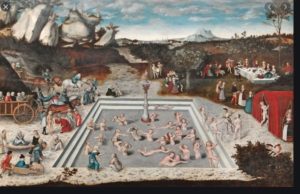| Même en volant Je n’aurai pas le temps, pas le temps De visiter toute l’immensité D’un si grand univers Même en cent ans Je n’aurai pas le temps de tout faire (…) Et pour aimer Comme l’on doit aimer Quand on aime vraiment Même en cent ans Je n’aurai pas le temps Pas le temps |
Even if I fly I won’t have the time, won’t have the time To visit all the immensity Of such a vast universe Even in a hundred years I won’t have time to do everything (…) And to love |
I won’t have time. Lyrics by Pierre Delanoë, sung by Michel Fugain (translation).
Theme of the month: Radiant Longevity
 In the last hours of April 2020, the fight against Covid-19 is in full swing. We seem to be well positioned to win a battle. But the war is not over.
In the last hours of April 2020, the fight against Covid-19 is in full swing. We seem to be well positioned to win a battle. But the war is not over.
Among the beautiful lessons of this struggle is the mobilization of billions of men and women from all countries and all walks of life to protect the weakest and the oldest.
To make women and men live much longer and in perfect health; to achieve « amortality » (biological immortality) – many humans have dreamed of it. In fiction, alongside negative visions of longevity without limits, there are more nuanced or positive stories. Some of these will be discussed in this letter. You may like to read it while listening to the song Forever Young by Alphaville or Je n’aurai pas le temps, quoted above, by Michel Fugain.
An « amortal » future?
In the science fiction movie In Time, technology makes it possible not to age. Humans can live for centuries with the body of a perfectly young person. But every human has an electronic counter inside him that kills him if he reaches 0. The time on each counter can be bought, sold, and stolen in an extremely socially divided society.
But at the end of the story, thanks to the hero’s revolt, the clocks stop. In this story the « good guys », victims of the merchants of time, prevail against the « bad guys ». It is also a victory in a world that promises to have no more aging.
Mr. Nobody, in 2009, was the first widely distributed science fiction film in which « normal » human beings are those who live without aging. And the hero is, at 118, the last man to die of aging.
Kim Stanley Robinson is the author of The Mars Trilogy. In these books, scientists have developed treatments that allow them to live for more than 200 years. This does not prevent accidents, there are health problems and it is not an unlimited life, but it does make life easier in a strange world.
Reborn or rejuvenated without limits?
2001: A Space Odyssey is, for many, the best science fiction film ever made. Right at the end of the film, the hero, after seeing himself as an old man, seems to be reborn as a baby. And in the book, written in parallel to the film, the last sentence illustrates the hope of what we cannot even imagine yet. For though he was now the master of the world, he was not quite sure what to do next. But he would think of something.
The film Cocoon is a beautifully optimistic science fiction story. Old people in a Florida retirement home discover a pool with strange stones that regenerate their bodies. These stones are in fact extraterrestrial. Visitors allow those who wish to do so to leave the earth for their distant world. Retirees, except one, will prefer space to decrepitude.
The series born in the Sixties, Doctor Who is the longest science fiction series of all time. Its impact has been considerable. The doctor hero of the film is an alien who can regenerate after his death, return in another body and carry on like this for centuries.
In the beautiful cycle of novels To Your Scattered Bodies Go by the great science fiction writer Philip K. Farmer, humans who have lived since the beginning of mankind (and even other species of hominids) are resurrected in a world organized around a huge river. In this world, created by superhuman beings, death is impossible and leads to a systematic resurrection. Some people regret it, but the majority of humans are very comfortable with it.
Wisdom and religion for unlimited longevity?
In some stories, extraterrestrials or beings different from humans live extremely long lives. This makes them more sympathetic because they have had time to accumulate wisdom. It is the cliché of the « old master », which is rather positive. Longevity is serene and even funny. The most famous example is that of Yoda in Star Wars who is more than 800 years old. But there is also Nicolas Flamel in Harry Potter and the Philosopher’s Stone, Elrond in the novels of J.R.R. Tolkien and, for the youngsters, the 542-year-old Papa Smurf.
And let’s not forget. Whether we are believers, atheists or agnostics, we all know the stories of heavenly life associated with a life without end. According to these accounts, humans could exist beyond death. And in these visions, even though existence often lasts for eternity, boredom, decrepitude, weariness… do not appear.
Indeed, religions, almost without exception, explain to us what happens after death. And many of these futures are radiant for the faithful who behaved well. It is the paradise of the Christians or Muslims, the Valhalla of the Nordic peoples, the Elysian Fields of the ancient Greeks, the fields of Aaru of ancient Egypt, the heaven and the realms of immortality of the Taoists, …
Positive stories of a much longer life are therefore countless. Technical, social and healthcare advances already allow us a much more radiant and much longer life than we could have dreamed of a few centuries ago. Current events show us that progress is still fragile. And it shows us that we can mobilize more than we would have thought in order to make progress together.
News of the month: The fight against Covid-19 even more intense
As already mentioned in last month’s letter, never before in the history of mankind has a disease been fought so quickly, with so much energy, scientific, economic, political and financial means.
Today, it is mainly containment that saves lives, a technique that has been around for thousands of years. But clinical trials are accelerating. Research into immunity, vaccines, stem cells, antivirals and antibodies has never been so numerous. The work is also being done with more interaction and sharing of knowledge than ever before. Tomorrow it will probably be with even more cooperation. This could be done at the level of the World Health Organization or by other organizations with an international dimension such as that recently announced by American and European public and private bodies.
Let us remember: the virus can affect almost everyone, but it almost only kills the elderly or the very elderly. Tomorrow, when the virus is defeated or tamed, the elderly will not be spared from other diseases. It will be necessary that human and material resources are then directed to enable the elderly to enjoy health as defined by the WHO. This is a state of complete physical, mental and social well-being and not merely the absence of disease or infirmity.
For more information, please visit:
- heales.org, sens.org, longevityalliance.org and longecity.org.
- Image source. Fountain of Youth (detail). From Sphaera.

